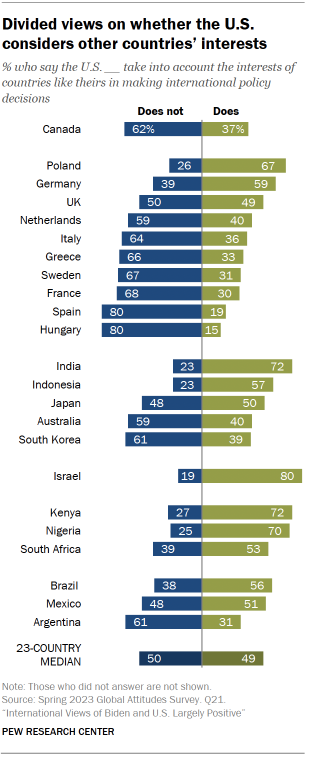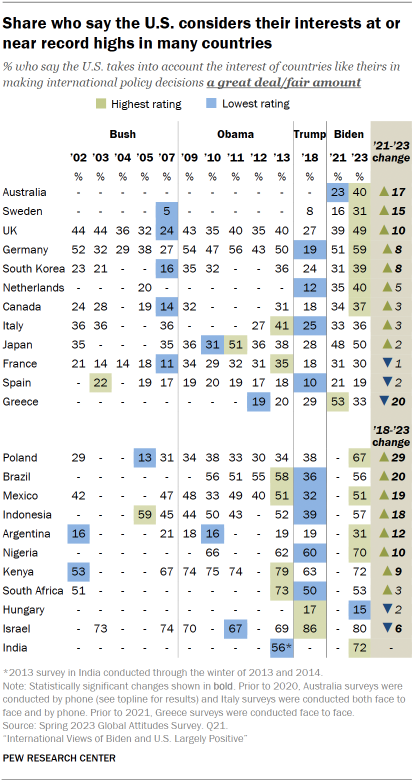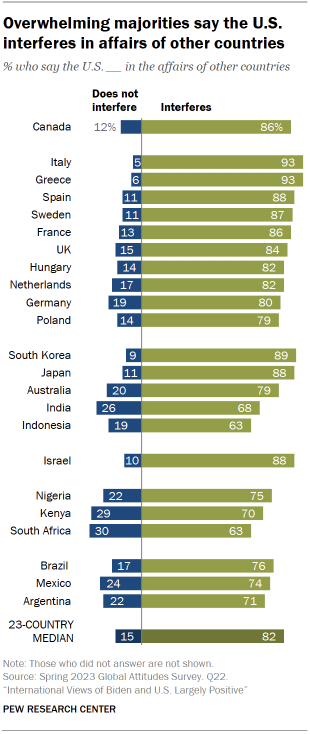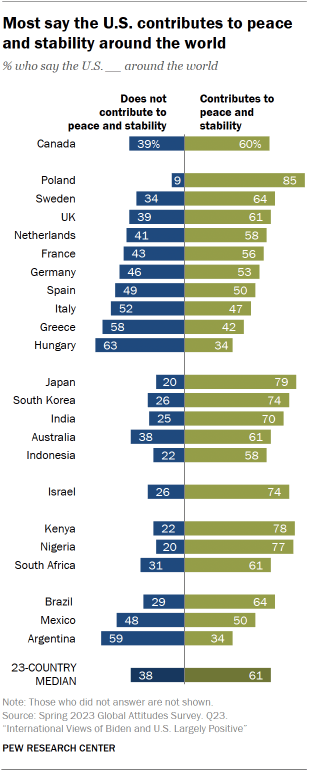
To assess how people perceive America’s role on the world stage, we asked respondents to what extent they feel the U.S.:
- Considers the interests of countries like theirs when making international policy decisions;
- Interferes in other countries’ affairs; and
- Contributes to peace and stability around the world.
Does the U.S. consider other countries’ interests?
A median of 50% across the 23 countries surveyed say the U.S. does not take their country’s interests into account in making international policy decisions, while a median of 49% say the U.S. does take interests into account at least a fair amount.
Majorities in 11 countries say the U.S. does not take their interests into account, and this sentiment is particularly strong in Europe. For example, eight-in-ten of those in Hungary and Spain say the U.S. does not consider their interests, and roughly seven-in-ten in France and Sweden say the same.
In Japan, Mexico and the UK, views are split: Roughly half say the U.S. takes their interests into account and nearly equal shares say it does not.

Majorities in eight countries – Israel, India, Kenya, Nigeria, Poland, Germany, Indonesia and Brazil – believe the U.S. does take their interests into account when making international policy decisions. Israel, where the highest share holds very favorable views of the U.S. (51%), stands out on this measure: 80% say the U.S. considers their interests, although this is down 6 percentage points from 2018.
In many countries, the share who say the U.S. considers their interests on policy decisions at least a fair amount has increased significantly since the question was last asked. Shifts are particularly large in countries where this question was last asked in 2018, during Trump’s presidency. For instance, 38% of Poles surveyed in 2018 said the U.S. took their interests into account; this year, two-thirds say the same.
Significant increases from 2018 are also found in Brazil, Mexico, Indonesia, Argentina, Nigeria and Kenya.
There have also been significant increases in several countries where this question was last asked in 2021, including Australia, Sweden, the UK, Germany and South Korea.

Greeks, however, have grown more pessimistic on this measure. One-third say the U.S. takes their interests into account, down 20 percentage points from the 53% who said the same in 2021.
Does the U.S. interfere in other countries?
A median of 82% across all countries surveyed say the U.S. interferes a great deal or a fair amount in the affairs of other nations, while 15% say it does not interfere much or at all. Majorities agree with this sentiment in every country surveyed, including about nine-in-ten or more in Italy, Greece, South Korea, Israel, Japan, Spain and Sweden.
In six countries – including five European nations – half or more believe the U.S. interferes a great deal.
No more than 30% in any country surveyed say the U.S. does not interfere much or at all. The highest share says this in South Africa. About a quarter or more in Kenya, India, Mexico, Argentina and Nigeria believe the U.S. does not interfere much or at all.
In 16 countries, men are more likely than women to say the U.S. interferes in the affairs of other countries a great deal. For example, 46% of men hold this opinion in the Netherlands, compared with 27% of women.
Does the U.S. contribute to peace and stability?

Across the 23 countries surveyed, a median of 61% say the U.S. contributes to peace and stability around the world, compared with 38% who say it does not.
Majorities in 16 countries say the U.S. contributes to world peace at least a fair amount, including 85% in Poland.
However, the sense that the U.S. does not contribute to peace and stability is more widespread in Europe compared with other regions, and about six-in-ten express this opinion in Hungary and Greece.
In most of the other countries surveyed, solid majorities say the U.S. does contribute to peace and stability. Argentines and Mexicans are exceptions: 59% in Argentina say the U.S. does not contribute these things to the world, while opinion in Mexico is mixed.
In Canada, Australia and several European countries, adults ages 40 and older are more likely than those ages 18 to 39 to say the U.S. contributes to world peace and stability. In Sweden, for example, those 40 and older are 23 percentage points more likely to say the U.S. contributes to peace than those ages 18 to 39.
However, in India, South Korea and Brazil, the opposite pattern is present: Younger people are more likely than their older counterparts to say the U.S. contributes to peace and stability.




